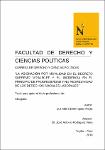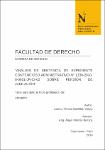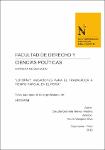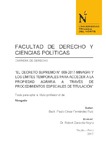Mostrar el registro sencillo del ítem
La asignación por movilidad en el Decreto Supremo Nº 264-90-EF y su incidencia en el principio de progresividad y no regresividad de los derechos sociales laborales
| dc.contributor.advisor | Rodríguez Viera, José Antonio | |
| dc.contributor.author | Domínguez Rojas, Luz María | |
| dc.date.accessioned | 2018-04-30T14:54:44Z | |
| dc.date.available | 2018-04-30T14:54:44Z | |
| dc.date.issued | 2018-03-12 | |
| dc.identifier.citation | Domínguez, L. M. (2018). La asignación por movilidad en el Decreto Supremo Nº 264-90-EF y su incidencia en el principio de progresividad y no regresividad de los derechos sociales laborales [Tesis de licenciatura, Universidad Privada del Norte]. Repositorio de la Universidad Privada del Norte. https://hdl.handle.net/11537/13258 | es_PE |
| dc.identifier.other | 344.01 DOMI | es_PE |
| dc.identifier.uri | https://hdl.handle.net/11537/13258 | |
| dc.description.abstract | La presente investigación realiza un trabajo consistente en el estudio y análisis del Decreto Supremo N°264-20-EF, sobre otorgamiento de -Asignación por Movilidad en el Régimen Laboral Público-, así como el de los diversos decretos supremos que la modificaron desde su primigenia dación en el año 1985 hasta el año 1990 y su intrinseca relación con la progresividad y no regresividad de los Derechos Sociales o los tambien llamados Derechos Económicos, Sociales y Culturales, específicamente enmarcado en el Derecho Económico circunscrito en la Remuneración Suficiente, y en el Derecho Social ahondado en la calidad de vida digna de los trabajadores. Asimismo, mediante el estudio de sentencias de vista de la causa sobre reintegro por refrigerio y movilidad peticionados por los beneficiarios de ésta asignación, se examinará el criterio tomado por los magistrados respecto a los fundamentos que éstos consideran para declarar infundadas dichas peticiones, lo cual los conlleva a indicar que el monto otorgado se encuentra conforme a Ley, así también se efectuó un análisis de los impedimentos normativos que limitan que la asignación posea un incremento. Por otro lado, se desarrollaron entrevistas a especialistas en Derecho Laboral y Procesal Laboral, con el propósito de obtener opiniones fidedignas respecto a la postura que conservan sobre tres puntos importantes, el primero radica en la actual forma de pago de la asignación por movilidad, el segundo se basa en si los mismos estiman conveniente una actualización del monto otorgado, y finalmente como tercer punto si consideran que el Decreto Supremo N°264-90-EF vulnera el principio de progresividad y la prohibición de regresividad contemplado en el artículo 26 de la Convención Americana sobre Derechos Humanos y en el artículo 2.1. del Pacto Internacional de Derechos Económicos, Sociales y Culturales, instrumentos que forman parte del Sistema Internacional de Derechos Humanos, y que han sido debidamente ratificados por nuestro país, formando parte del bloque de constitucionalidad de obligatorio cumplimiento; dichas entrevistas serán confrontadas con los resultados obtenidos, lo cual permitiría arribar a un mejor entendimiento del hecho planteado en el problema de investigación y dilucidar si la hipótesis descrita refleja la información obtenida. Por tanto, el presente trabajo analiza la incidencia del Decreto Supremo Nº264-90-EF en el principio de progresividad y no regresividad de los Derechos Sociales Laborales, tomándose en cuenta los criterios de los instrumentos internacionales, así como criterios doctrinarios y jurisprudenciales, con el propósito de proponer una actualización del monto otorgado por la asignación en aras de que cubra el fin por el que fue otorgado originariamente y vaya acorde con el actual costo de vida de los beneficiarios. | es_PE |
| dc.description.abstract | The present investigation carries out a consistent work in the study and analysis of the Supreme Decree N ° 264-20-EF, on the granting of -Assignment for Mobility in the Public Labor Regime-, as well as that of the various supreme decrees that modified it from its primitive dation in the year 1985 until the year 1990, and its intrinsic relationship with the progressiveness and non-regressivity of Social Rights or the so-called Economic, Social and Cultural Rights, specifically framed in Economic Law circumscribed in Equitable and Sufficient Remuneration, and in the Social Law deepened in the quality of life worthy of the workers. Likewise, by examining judgments of the case on reimbursement for refreshment and mobility requested by the beneficiaries of this assignment, the criterion taken by the judges shall be examined with regard to the grounds they consider to declare the petitions unfounded and indicate that the Amount awarded is the right one. On the other hand, interviews were developed with specialists in Labor Law and Labor Procedure, in order to obtain reliable opinions regarding the position they have on three important points: the first is on the current form of payment of the mobility allowance, the Second is whether they consider an update of the amount granted, and finally as a third point if they consider that D.S.N° 264-90-EF violates the principle of progressivity and the prohibition of regressivity contemplated in Article 26 of the American Convention on Human Rights and In Article 2.1. of the International Covenant on Economic, Social and Cultural Rights, instruments which form part of the International Human Rights System and which have been duly ratified by our country, forming part of the constitutionality block of mandatory compliance; These interviews will be confronted with the results obtained, which would allow us to arrive at a better understanding of the fact raised in the research problem and to elucidate if the hypothesis described reflects the information obtained. Therefore, the present study analyzes the incidence of Supreme Decree No. 264-90-EF in the principle of progressive and non-regressivity of labor social rights, taking into account the doctrinal criteria of international instruments and jurisprudential criteria, with the purpose of proposing An update of the amount granted by the assignment in order to cover the purpose for which it was originally granted and in accordance with the current cost of living of the beneficiaries of the same. | es_PE |
| dc.description.uri | Tesis | es_PE |
| dc.format | application/pdf | es_PE |
| dc.format | application/msword | es_PE |
| dc.language.iso | spa | es_PE |
| dc.publisher | Universidad Privada del Norte | es_PE |
| dc.rights | info:eu-repo/semantics/openAccess | es_PE |
| dc.rights | Atribución-NoComercial-CompartirIgual 3.0 Estados Unidos de América | es_PE |
| dc.rights.uri | https://creativecommons.org/licenses/by-nc-sa/3.0/us/ | * |
| dc.source | Universidad Privada del Norte | es_PE |
| dc.source | Repositorio Institucional - UPN | es_PE |
| dc.subject | Movilidad profesional | es_PE |
| dc.subject | Derechos sociales y económicos | es_PE |
| dc.subject | Derecho civil | es_PE |
| dc.subject | Trabajadores | es_PE |
| dc.subject | Derecho del trabajo | es_PE |
| dc.subject | Legislación por decretos | es_PE |
| dc.title | La asignación por movilidad en el Decreto Supremo Nº 264-90-EF y su incidencia en el principio de progresividad y no regresividad de los derechos sociales laborales | es_PE |
| dc.type | info:eu-repo/semantics/bachelorThesis | es_PE |
| thesis.degree.grantor | Universidad Privada del Norte. Facultad de Derecho y Ciencias Políticas | es_PE |
| thesis.degree.level | Título Profesional | es_PE |
| thesis.degree.discipline | Derecho y Ciencias Políticas | es_PE |
| thesis.degree.name | Abogado | es_PE |
| dc.publisher.country | PE | es_PE |
| dc.subject.ocde | https://purl.org/pe-repo/ocde/ford#5.05.01 | es_PE |
| thesis.degree.program | Pregrado | es_PE |
| dc.description.sede | Trujillo El Molino | es_PE |
| renati.advisor.dni | 17871205 | |
| renati.advisor.orcid | https://orcid.org/0000-0002-6568-5835 | es_PE |
| renati.author.dni | 72209997 | |
| renati.discipline | 421056 | es_PE |
| renati.juror | Vicuña Gonzales, Gustavo | |
| renati.juror | Reyes Guerra, Javier Arturo | |
| renati.juror | De La Rosa Gonzales Otoya, Jorge | |
| renati.level | https://purl.org/pe-repo/renati/level#tituloProfesional | es_PE |
| renati.type | https://purl.org/pe-repo/renati/type#tesis | es_PE |
Ficheros en el ítem
Este ítem aparece en la(s) siguiente(s) colección(ones)
-
Tesis [828]








